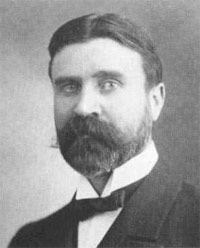THE PERSON AS A WHOLE.
This department has so often stressed in various ways the fundamental ideas of the unity, continuity and substantiality of Life or Mind as the primary, all inclusive, substantive entity or “simple substance” from which all organisms and functions evolve; the duality-in-unity of the living organism manifested as body and mind; the biodynamical and psychophysical nature of the problems with which medicine primarily deals the necessity of individualization and the study and treatment of each person or case as a whole, with the normal individual as a standard and his entire environment as a background, that it is most gratifying and encouraging to find so eminent an author, scientist, teacher and physician as Lewelleys F. Barker, M. D., LL. D., of Johns Hopkins University, Baltimore, taking substantially the same position in regard to these subjects and in phrases, illustrations and mode of treatment often strikingly similar, setting forth directly or by implication the same great truths and ideals.
It is all the more encouraging, when one comes to realize after an examination of current medical literature, that Dr. Barker speaks not alone for himself, but for the representatives of the highest and most advanced thought of the school in which he is pre-eminent. It thus appears that the philosophy of homoeopathy which this Department attempts to expound rests upon principles and concepts which the highest representatives of modern medicine are beginning to accept.
Dr. Barkers paper indicates that the trend of thought is toward the ultimate recognition and acceptance of a common philosophy as a bond of union between all schools of medicine. In no other way is it possible to bring about anything like a real unity in the medical profession than by agreement among the leaders upon certain fundamental philosophical concepts and principles. Adjustment of differences in rules and methods of practice follows smoothly and naturally. It is this agency, working quietly and unostentatiously by exchange of thought, that is gradually bringing about a better understanding and a closer cooperation among medical men throughout the world.
Although this remarkable article by Dr. Barker, reprinted here from the New York State Journal of Medicine for November, 1922, was addressed to Neuropsychiatrists, it will be found to be illuminating and inspiring to every true follower of Hahnemann, who founded his system of therapeutic medication (when not fully expressed) in it, and expounded it in “The Organon of Medicine.” The article follows, italicized by the Editor.


